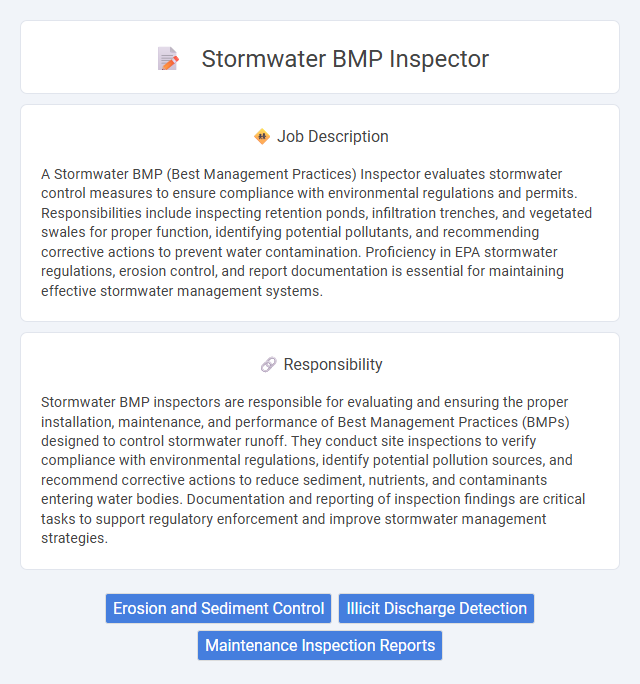
A Stormwater BMP (Best Management Practices) Inspector evaluates stormwater control measures to ensure compliance with environmental regulations and permits. Responsibilities include inspecting retention ponds, infiltration trenches, and vegetated swales for proper function, identifying potential pollutants, and recommending corrective actions to prevent water contamination. Proficiency in EPA stormwater regulations, erosion control, and report documentation is essential for maintaining effective stormwater management systems.
Individuals with strong attention to detail and a genuine concern for environmental sustainability are likely suitable for a Stormwater BMP inspector role. Those who can tolerate outdoor work in varying weather conditions and possess good communication skills might be more successful in identifying and reporting stormwater management practices. Candidates with physical stamina and the ability to work independently could have a higher probability of thriving in this position.
Qualification
A Stormwater BMP Inspector must possess comprehensive knowledge of stormwater management systems and local, state, and federal environmental regulations such as the Clean Water Act. Essential qualifications include certification in stormwater pollution prevention plans (SWPPP), proficiency in inspecting best management practices (BMPs) for erosion control and water quality, and experience with site assessment tools and reporting software. Strong observational skills, attention to detail, and the ability to identify potential compliance issues are critical for ensuring effective stormwater BMP implementation and environmental protection.
Responsibility
Stormwater BMP inspectors are responsible for evaluating and ensuring the proper installation, maintenance, and performance of Best Management Practices (BMPs) designed to control stormwater runoff. They conduct site inspections to verify compliance with environmental regulations, identify potential pollution sources, and recommend corrective actions to reduce sediment, nutrients, and contaminants entering water bodies. Documentation and reporting of inspection findings are critical tasks to support regulatory enforcement and improve stormwater management strategies.
Benefit
Stormwater BMP inspector jobs likely offer substantial benefits such as enhancing environmental protection and promoting sustainable water management practices. These roles probably contribute to public health by preventing pollution and managing runoff effectively. Employment may also provide opportunities for career growth in the environmental and regulatory sectors.
Challenge
Stormwater BMP inspector roles likely involve the challenge of accurately assessing diverse and complex best management practices under varying weather conditions. Inspectors probably face difficulties in identifying subtle signs of system failure or non-compliance, requiring keen attention to detail and thorough knowledge of environmental regulations. The need to balance rigorous enforcement with community engagement may also pose ongoing challenges in ensuring effective stormwater management.
Career Advancement
Stormwater BMP inspectors play a crucial role in environmental protection by ensuring compliance with stormwater management regulations and maintaining best management practices (BMPs). Career advancement opportunities include moving into senior inspection roles, environmental compliance management, or specializing in water resources engineering and consulting. Gaining certifications such as Certified Stormwater Inspector (CSI) or Professional Engineer (PE) can further enhance career growth and salary potential.
Key Terms
Erosion and Sediment Control
Stormwater BMP inspectors specializing in erosion and sediment control evaluate construction sites to ensure compliance with local, state, and federal regulations designed to minimize soil erosion and sediment runoff. They conduct site assessments, identify potential erosion risks, and verify the proper installation and maintenance of best management practices such as silt fences, sediment basins, and erosion control blankets. Accurate documentation and reporting of inspection findings help prevent water quality degradation and promote sustainable stormwater management practices.
Illicit Discharge Detection
Stormwater BMP inspectors specializing in Illicit Discharge Detection conduct thorough inspections and sampling to identify unauthorized pollutants entering the stormwater system. They analyze discharge sources to ensure compliance with environmental regulations, preventing contamination of local waterways. Their expertise supports municipal efforts to maintain water quality and protect public health by enforcing best management practices (BMPs).
Maintenance Inspection Reports
Stormwater BMP inspectors conduct detailed Maintenance Inspection Reports to ensure compliance with environmental regulations and optimal performance of stormwater best management practices. These reports document the condition of BMP installations, identify signs of clogging, sediment buildup, or structural damage, and recommend necessary repairs or maintenance actions. Accurate and timely reporting is essential to prevent pollution, manage runoff effectively, and support sustainable stormwater management programs.
 kuljobs.com
kuljobs.com